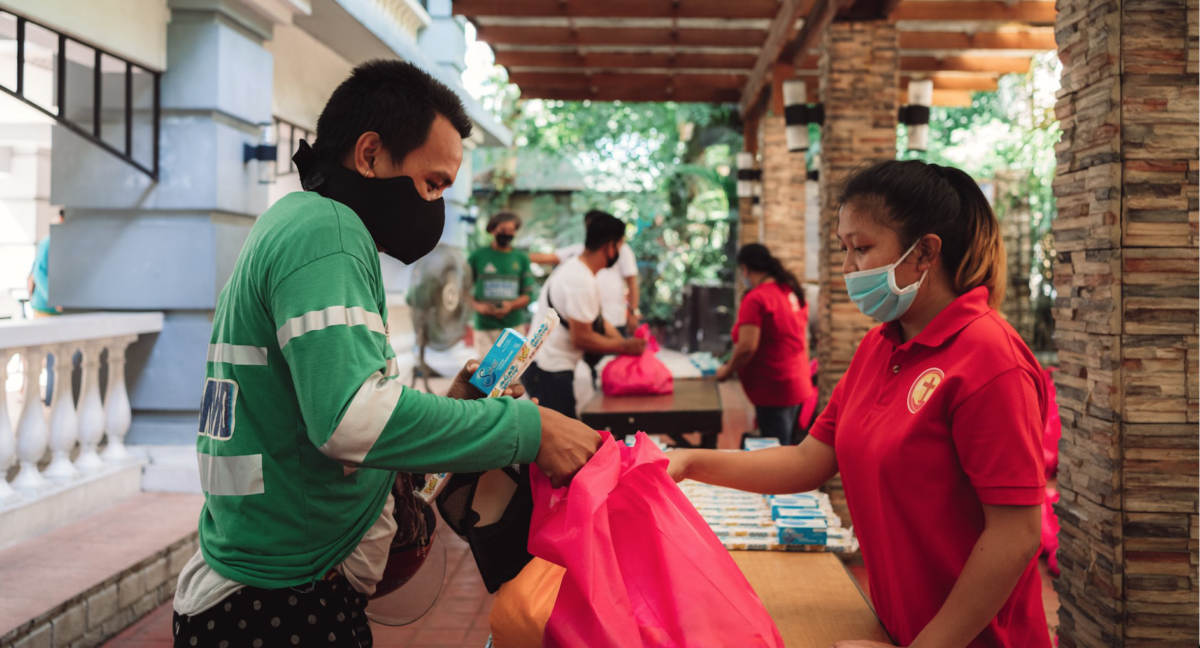Reaching the Unheard to Overcome COVID-19: Religions for Peace Interfaith Youth in the Philippines
20200804The Religions for Peace Philippines Interfaith Youth Committee spearheaded a multi-religious campaign to mitigate the impact of the COVID-19 pandemic on the most vulnerable in Metro Manila, Philippines. The To Get There: Reaching Out To The Unheard campaign delivered food packages, sanitation essentials, and COVID-19 educational pamphlets to over 400 people including garbage collectors, indigenous peoples, street sweepers, informal settlers and displaced contractual workers, with support from eight places of worship including churches, mosques, and Buddhist temples. But fighting the coronavirus proved to be a challenge even for these committed young leaders.
The strict lockdown of Metro Manila, a densely populated area of nearly 13 million, has made it exceptionally challenging to communicate with temples, churches, and mosques—whose offices are empty—and to coordinate with suppliers for products. With places of worship closed and disruptions in the food and supply chains, the campaign divided into two teams to overcome obstacles. The Food and Sanitation Essentials Team and the Point Persons Team created an innovative and immediate approach to the pandemic by leveraging their influence on social media platforms. The teams designed a successful crowdsourcing initiative by publishing materials about the campaign to their personal social media accounts which not only expanded their network, but also identified potential suppliers and facilities that they could use to deliver food packages.
“Execution depended on social media,” stressed Project Head Louise Obispo. In fact, the teams contacted mosques, churches, and Buddhist temples that did not have websites via Facebook messenger to support the reopening process of these places of worship. Even so, they did not undertake a piecemeal approach to the global pandemic. The teams also countered misinformation by disseminating flyers on handwashing techniques to the targeted communities and posters on how to keep places of worship clean.
These far-reaching efforts would not have been realised without the support of diverse religious communities. Since the onset of the pandemic, the Good Shepherd Cathedral and the Grace Life Church of Payatas supported the teams to deliver resources and supplies, prepare food packages, and identify communities in need of additional relief. For Ricks Santos, project supervisor and member of the Point Persons Team, coordinating with religious leaders surpassed simply assisting in relief operations. “This experience opened my eyes to all of the activities that [religious communities] handle with regards to humanitarian support.” His personal commitment to multi-religious collaboration also motivated him to explore different religions, traditions, and cultures through this campaign, thus strengthening the relationship between Religions for Peace Philippines and various religious and underserved communities and further serving as a network for religious leaders to connect with the broader Metro Manila community.
“This project also opened doors for religious leaders. We are both benefitting from, not only this project, but also opportunities for collaboration on future projects,” stressed Kaye Jimenez, Project Head and Secretary of Religions for Peace Philippines Interfaith Youth Committee.
“[The Interfaith Youth Committee] is doing an outstanding service to humanity at large,” reiterated Ms. Indravali Devi Dasi, the Officer in Charge at SKCON Sri Sri Radha Madhave Mandir Temple in Manila. “This project is perfect timing during the pandemic. Multi-religious cooperation for peace is the hallmark of Religions for Peace. The youth are advancing an amazing project in protecting the life of every citizen in this country.”
Strengthened by religious and spiritual values of equality, empathy and human dignity, Ms. Obispo emphasised that her commitment to serving others is rooted in the Catholic teaching “to serve others is to serve God.” Reflecting introspectively, Ms. Jimenez shared that in order to alleviate the disproportionate burden of the pandemic on vulnerable communities, the campaign aimed to serve not only the “church of the poor” or poor communities, but all those of many faiths and no faith, who are equally impacted.
For more videos, graphics and knowledge, be sure to follow the work of the RfP Philippines Youth Committee on the RfP Philippines Facebook page.
To stay up to date on work of RfP Youth around the world, follow the RfP Youth Media Team on Facebook, Twitter and Instagram.
